Marchés
Lors de la conception d’une intervention humanitaire et de la prise de décisions quant à l’utilisation des transferts monétaires, l’analyse générale des options de réponse doit inclure une analyse de marché. Il est prouvé qu’offrir un soutien ciblant le fonctionnement des marchés accélère la reprise et accroît la résilience dans les zones affectées par une catastrophe.
De nombreuses organisations ont investi dans la mise au point d’outils visant à faciliter l’analyse de marché et réfléchissent à la mise en place de programmes basés sur les marchés plus holistiques. Elles envisagent des interventions tirant profit du marché (basées notamment sur des transferts monétaires aux populations affectées), ainsi que des interventions soutenant directement les marchés (comme l’octroi de subventions conditionnelles aux vendeurs/euses pour la remise en condition du marché).
Initiatives associées
Contenu associé

1.2 Introduction à l’analyse de marché
Cours
Ce cours de 30 minutes offre une introduction à l’analyse de marché pour les contextes d’urgence. Il contient des contributions d'experts dans ce domaine. Ce cours a été développé en collaboration avec l'International Rescue Committee et le CALP Network et grâce au financement d’USAID/OFDA et de l’Agence Suisse pour le Développement et la Coopération. Il est destiné aux...

2.4 Un guide pratique pour l’analyse de marché
Cours
Ce cours en ligne de 3.5 heures vise à fournir aux équipes qui conduiront des analyses de marchés en contextes humanitaires une compréhension approfondie de la théorie et des étapes à suivre afin de leur permettre de comprendre le pourquoi et le comment du processus à suivre. Les participants seront guides à travers un scenario d'analyse de marchés d'urgence. Ce cours s'appuie sur...
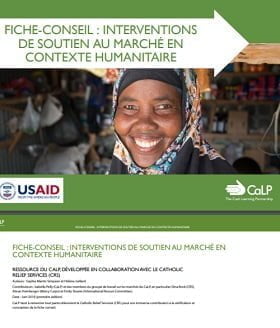
Fiche-Conseil : Interventions de soutien au marché en contexte humanitaire
Guides et outils
La fiche conseil définit le programme de soutien au marché en contexte humanitaire et le décrit dans la pratique. Elle permet aux praticiens humanitaires d’envisager systématiquement des interventions de soutien au marché, parallèlement à d’autres activités du programme. Le champ d’application comprend des interventions de soutien au marché axées sur l’offre/la disponibilité...
Thematic lead
Latest

LOUISE Learning Review
Report
This report presents the outcomes of the learning review on the Lebanon One Unified Inter-Organizational System for E-cards (LOUISE) platform commissioned by UNICEF on behalf of the LOUISE agencies (WFP, UNHCR, UNICEF) in 2019 to build on the LOUISE experience and conduct a stock-taking exercise. The...
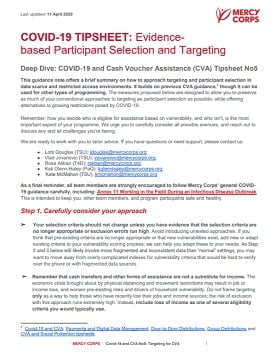
Mercy Corps’ Tipsheet No 5: Evidence-based Selection and Targeting
Guidelines and Tools
Mercy Corps’ Tipsheet No 5: Evidence-based Selection and Targeting

MERS Guidance in Response to COVID-19
Guidelines and Tools
In this rapidly evolving context, we know it is important to continue providing updates of the latest thinking from MERS collaborators. Below are updates to the March 25 guidance on how the MERS Standards can help you adapt your current programs in light of the COVID-19 pandemic. Some suggestions on...
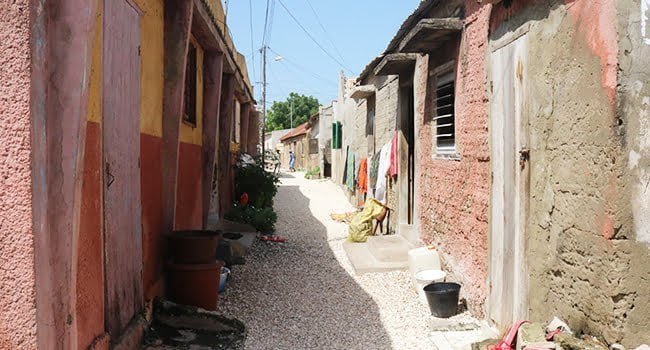
Impossible Choices – questioning assumptions behind lock-down in low income and fragile contexts
Blog Post
“The COVID-19 pandemic will have devastating consequences on people’s livelihoods and employment, especially in post-fragile, crisis and post-crisis environments.” Global Humanitarian Response Plan: COVID-19 Over the last few weeks we’ve seen significant discussion on the CALP Network d-groups and...
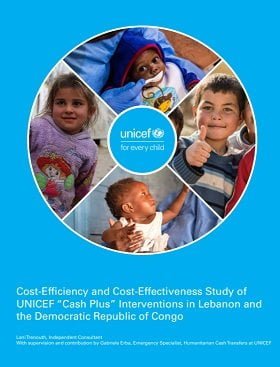
Cost-Efficiency and Cost-Effectiveness Study of UNICEF “Cash Plus” Interventions in Lebanon and the Democratic Republic of Congo.
Policy paper
The combination of basic services delivery and cash transfers is known among humanitarian practitioner as “cash plus”. This approach represents a solid comparative advantage for UNICEF considering its footprint in basic services delivery as well as its commitment to scale up humanitarian cash...
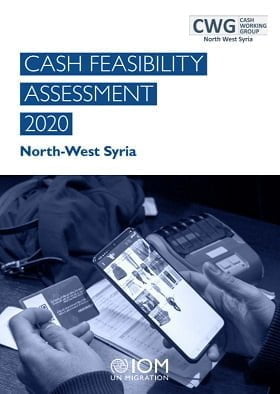
Cash Feasibility Assessment for NorthWest Syria
Report
The objective of this cash feasibility assessment for northwest Syria is to provide evidence-based, structured analysis of the various dimensions that make cash and vouchers interventions feasible. The primary audience for this document are all the organizations either currently involved in cash-based...

CVA for health outcomes
Webinar
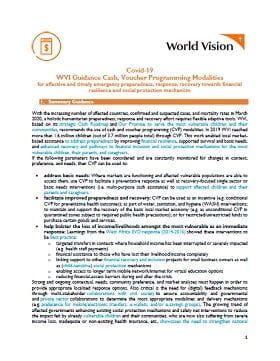
Covid-19 WVI Cash, Voucher Programming Modalities
Guidelines and Tools
With the increasing number of affected countries, confirmed and suspected cases, and mortality rates in March 2020, a holistic humanitarian preparedness, response and recovery effort requires flexible adaptive tools. WVI, based on its strategic Cash Roadmap and Our Promise to serve the most vulnerable...
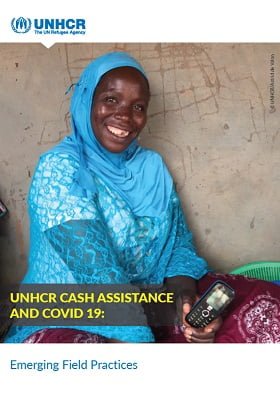
UNHCR Cash Assistance and Covid 19: Emerging field practices
Guidelines and Tools
This document is a snapshot of the many innovative field practices emerging in light of COVID-19.
UNHCR preparedness and response to COVID-19 is comprehensive including cash assistance as quick and efficient means of getting assistance to people fast, empowering families to deal with the crisis and meet...
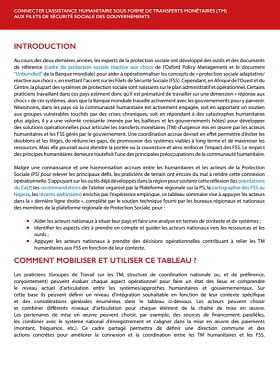
Connecter l’Assistance Humanitaire sous forme de Transferts Monétaires (TM) aux Filets de Sécurité Sociale des Gouvernements
Guides et outils
Ce document élaboré par la Plateforme Régionale pour la Protection Sociale vise à : Aider les acteurs nationaux à situer leur pays et faire une analyse en termes de contexte et de systèmes ; Identifier les aspects clés à prendre en compte et guider les acteurs nationaux vers les ressources et les...

Fiche conseils sur la coordination des transferts monétaires
Guides et outils
Les Transferts Monétaires (TM) représentent une part croissante de la réponse humanitaire globale, avec un montant estimé à 4,7 milliards de dollars distribués dans le monde en 2018, contre 2,8 milliards de dollars en 2016. Dans ce contexte, une coordination efficace des TM est un élément de plus...

Statement on Likely Impacts of COVID-19 on Humanitarian Cash Transfers in Yemen
Report
The COVID-19 pandemic has now spread to the Middle East. Countries across the region are imposing measures to prevent further spread of the virus. Currently there are no confirmed cases in Yemen, but it is highly likely that COVID-19 will eventually reach the country. Organizations are shifting funding...

CCD Social Protection Working Group: Advocacy in response to COVID-19
Policy paper
The need for social protection in response to COVID-19: COVID-19 has an unprecedented impact globally in terms of access to and the capacity of healthcare systems to respond. The health crisis is yet to peak in many countries and in low income contexts, the concern is that its impact will be severe where...
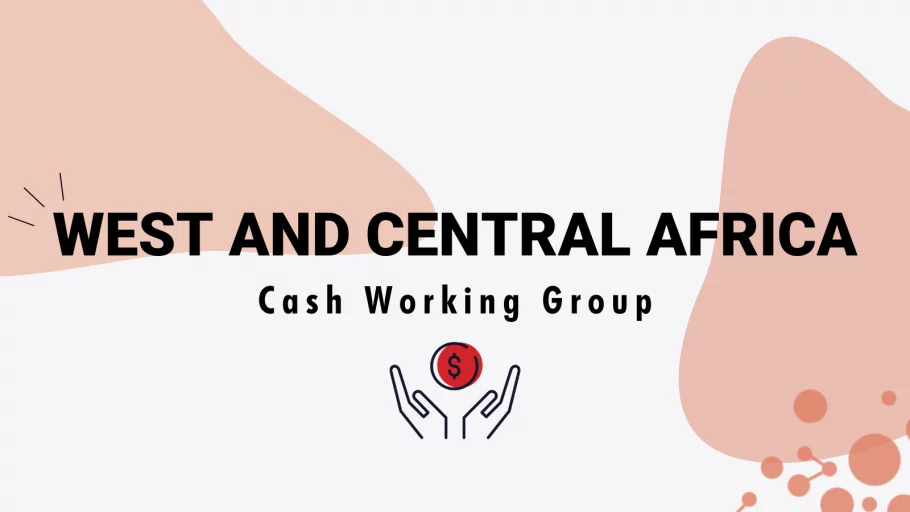
Minutes and recording from the WCAF regional CWG – 1 April 2020
Meeting minutes
Meeting on CVA and COVID19

Guidance Note on The Role of Cash and Voucher Assistance to Reduce Financial Barriers in the Response to the COVID-19 Pandemic, in Countries Targeted by the Global Humanitarian Response Plan COVID-19
Guidelines and Tools
The reality is that often people still have direct and indirect healthcare expenditures. This paper will explore different options to address these, and where to consider CVA options. The paper will also give general guidance to other sectors on how to apply epidemic mitigation measures while maintaining...
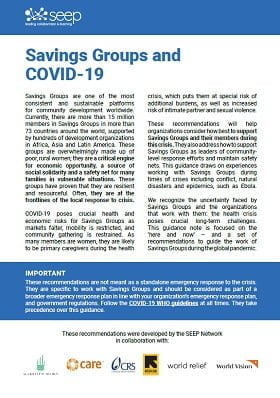
Savings Groups and COVID-19
Guidelines and Tools
COVID-19 poses crucial health and economic risks for Savings Groups as
markets falter, mobility is restricted, and community gathering is restrained. As many members are women, they are likely
to be primary caregivers during the health crisis, which puts them at special risk of additional burdens, as well...
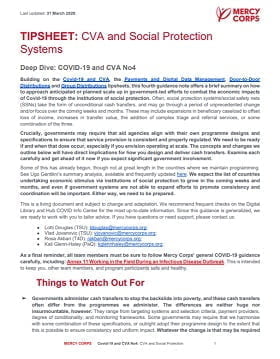
Mercy Corps’ tipsheet No 4: CVA and Social Protection Systems
Guidelines and Tools
Mercy Corps’ Tipsheet 4 – CVA and Social Protection Systems
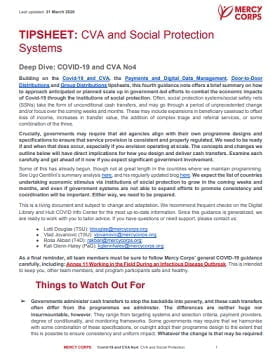
Tipsheet: CVA and social protection systems (COVID-19)
Guidelines and Tools
Building on the Covid-19 and CVA, the Payments and Digital Data Management, Door-to-Door Distributions and Group Distributions tipsheets, this fourth guidance note offers a brief summary on how to approach anticipated or planned scale up in government-led efforts to combat the economic impacts of Covid-19...
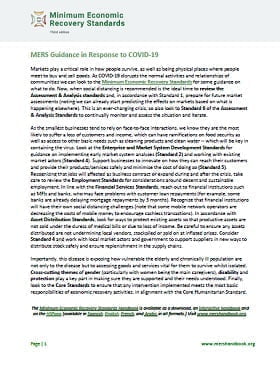
MERS Guidance in Response to COVID-19
Guidelines and Tools
Markets play a critical role in how people survive, as well as being physical places where people meet to buy and sell goods. As COVID-19 disrupts the normal activities and relationships of communities we can look to the Minimum Economic Recovery Standards for some guidance on what to do. Now, when social...

Looking into 2020: short overview on global clusters, CVA and the CALP Network
Presentation
Overview as 2020 begins:
• Significant progress and commitment from all global clusters on integration of CVA into their work.
• Significant interest in different regions and by some donors on sector-specific CVA.
• Challenges that remain:
o Dialogue: 1) Ensuring CVA specialists...
